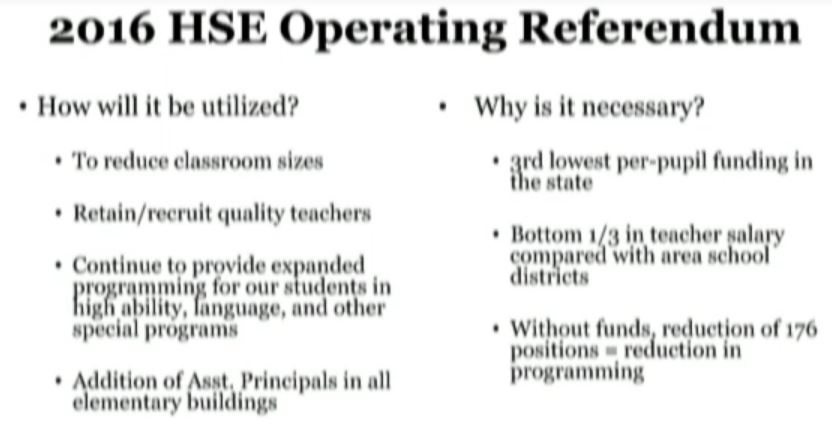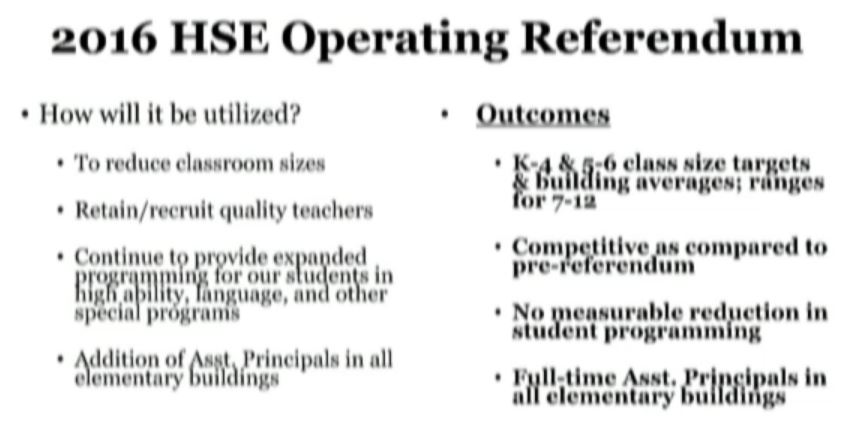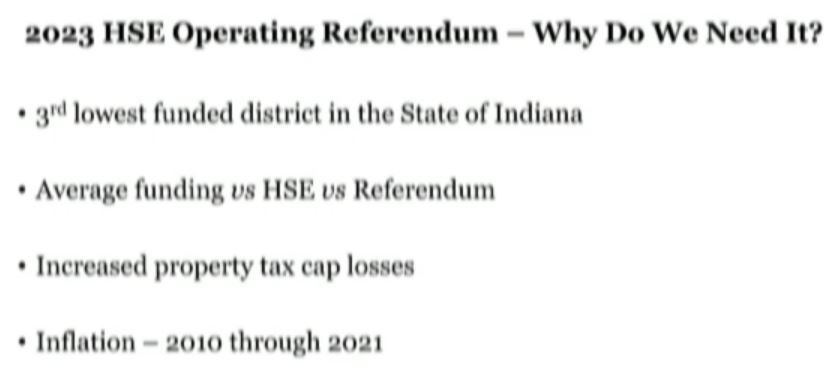The Hamilton Southeastern Schools Board had a work session on February 17, 2023 to go over the referendum and school funding. This was primarily educational for the new board members. Being that the CFO has covered this multiple times this past year in public meetings, nothing should have been new information to anyone that has been following the district. Because I’ve written about a lot of the information before, I’m not going to do detailed notes here on all of the details presented. I’ll only reiterate some of the highlights.
Update: Having now completed the meeting, my notes were a little more extensive than I intended. Like all “Live notes”, these are taken live while listening to the meeting. There could be errors in what I heard or wrote, so to get the most accurate information, watch the recorded meeting on the HSE School district’s site, HSESchools.org. These notes are rough, unedited, and not proofed.
- The 2016 HSE Operating Referendum is up for renewal. It adds about $25 million currently to the annual school budget (10%).
- The two main funds used in the district are the Education Fund and the Operations Fund.
- The Education fund is via state funding. This pays for teachers, staffing and such. Regulated on how fund can be spent.
- The Operations fund is primarily funded through property taxes.
- State allows up to 15% of Education fund to go to Operations fund. This would be up to about $22 million if HSE were to do this. But they don’t. Instead, $1.5 million is transferred from HSE operations to education for the education of our kids. Most districts transfer from Education to Operations. Only about 7 schools shift from operations to education. The focus is on pushing money towards the education of the kids versus toward operations.
- There are also other funds such as Debt Service funds (from property taxes), Food Services Funds, etc. Debt is kept in check to keep the tax rate flat. Food Services is entirely self funded within HSE and has to be kept separate.
- In Spring of 2008 is when property taxes were limited and changes to school funding were made. It was 2010 that the changes were fully in place. Tax caps cost HSE $4 million in the operations. The general fund became revenue supported by the state, it was a $300 million hit to public education in the state. Funds are, however, all related. Referendums didn’t exist prior to 2010.
- With property taxes, affluent areas are easier to collect the funds with assessed values going up. With other areas where property values are less affluent, property values might be stagnant or going down, so that can be an issue. Taxes are collected twice a year.
- School operation referendums must be voter approved.
- Complexity index formula has been modified. There is an increase in the foundation amount and other minor changes (This was good for HSE as I don’t believe we get many of the things above the basic amount). There was some funding increases this time around that were a little better than inflation – which hasn’t always been the case in the past.
- Referendum wording required by state – This has been covered several times in the past so I’m not adding notes here. Mostly the language forces the word “increase” even if you decrease the rate. Need to watch 2023 legislation around the use of the word “may” versus “shall” when it comes to sharing referendum dollars with charters.
- Referendum dollars can’t be used for capital improvements. She commented that referendum dollars can’t be used for things like renovating central office. (My Comment: No, but if you pass a referendum with a threat of firing teachers if it doesn’t pass and then turn around and renovate Central Office immediately after it passes, it simply doesn’t look good.)

- Standard to have assistant principals in an elementary with 500 or more kids. Without an AP, counselors end up doing the assistant principal tasks.

- Salaries are not simple to compare because there is a starting, average, and high-end for salaries. Salaries are important across all areas.

- Why 2023 HSE Operating Referendum?
- Third lowest funded district in the State
- Average funding for HSE is lower. It would be an additional $13.4 million for HSE if we were funded at the average for state funding. The three larger schools than HSE are funded above the average. This is generally due to the complexity schedule for funding.
- Increase property tax caps. About $4 million is “lost” due to property tax caps.
- Inflation
- How do they control non-classroom costs?
- Nurses – Costs Savings of $2.5 million. Don’t pay other than director. This is due to an agreement with Community.
- Outsource majority of Custodial staffing – $1 million saving roughly
- Standardized purchasing, so bigger spends to get better pricing
- Evaluation of non-strategic spending – Energy saving programs (Gas/Electric), Fuel – alternative fuel buses. Duke Energy’s rate increase was like $600,000 to $800,000 due to district size (?). Electric buses are more expensive, but fuel costs are lower. The district does lock into fuel prices in advance, which has saved tremendous amounts of money.
- Partnerships to reduce cost such as an MOU with City of Fishers for grounds maintenance and snow removal. Maintenance contracts.
- Ballot language and reporting requirements for referendum. – This has been covered in past meetings and past note. In summary – past language allowed you to say “continuing rate” or “reducing rate”. New language says “increase” regardless of continuing or reducing. It implies taxes could be going up, when in reality they are not planned to increase. Last year, in May 9 of 11 referendums passed in other districts. In November about half of them failed. It is believed that educating communities on the wording is key to getting a referendum to pass.
- Next steps for referendum:
- Additional information to be shared
- Board consensus on how to proceed regarding referendum
- A formal process will need to be created
- A referendum PAC committee will need to be formed.
- A district referendum committee should be formed
- Polling and voter data will be needed.
- “Questions, Feedback, and Elephants”
- Board is relative new. CFO and superintendent have been here 18 months. CFO asked, “what are the elephants”? She needs specifics.
- “We have too many administrators” is an elephant in the room. Would it be helpful to show student population versus number of administrators? The district report this to the state anyway. CFO wants to make sure she is producing what board wants to see and what the community wants to see. She needs to know what the board needs in order to feel informed. District spends $300 million a year, so she doesn’t deal with every little detail. She can, however, address issues if they are brought to her attention.
- Orr – Big picture, in general. If asking taxpayers to continue to pay the money they’ve been paying, then we need to know that everything being spent is for the education of the students. Granted the infrastructure stuff is needed. Would be good, however, to know how much is spent on different areas. For example, has administration grown at the same rate as district, or has it outgrown district growth. Need to show that every penny is going towards academic education and things that support to that. Are there things outside of the core focus that could be cut to tighten our belt….
- Suzanne – Is there an actual list of what the referendum dollars are specifically going to? Can the funds be redirected to other things? Response – In the 2016 the ballot there were specific areas mentioned. If you are going to move funds, you have to have specific areas to shift them to. For example, if you aren’t going to fund assistant principals with referendum dollars, then money would have to be found elsewhere to cover that cost – unless there is a decision to not fund those things. These are questions that need to be asked and reviewed. Things can be shifted, but the district will be held to the ballot language.
- Orr (his comment and responses mixed) – If the $25 million is what the referendum is going to drive, then based on the work session a few months ago, tightening our belt won’t get us to this savings. The funds from the referendum goes into a referendum fund, but this will fund operations. When it comes to keeping teachers paid higher, it could be used for that. The CFO would/can align referendum dollars in areas to show what it is doing – for example, they could align some teacher pay with the dollar to show it is helping to impact pay.
- CFO doesn’t believe in fear mongering (My comment: in 2016 there was some fear mongering in that we would lose 100+ staff if we didn’t pass the referendum). The CFO stated that we have to be aware of what we could lose, but we need to really focus on what we gain from the referendum. The CFO has been to by people we don’t need it. She has asked them where we can cut – for specifics. People will point to things that might cost $100,000, but we are a quarter of a billion-dollar organization and this is $25+ million.
- Pascoe – There hasn’t been a plan of what we would have and what we would not have if we did or didn’t referendum. She would like to see that list.
- Dr. Stokes – We have to message what the community wants. For example, we have the partnerships with Hub & Spoke, AgriPark, etc. When you ask the community what they want, it might be the question of the need for assistant principals. But then you have to look closer at what this means. Assistant principals help with a lot of things including things like discipline. When you think of a ration of 500 to 700 kids to 1 administrator in a school, that has an impact. When a change is made, it might have other impacts that the community doesn’t like. Is it effective that have 600 kids to one administrator.
- Pascoe – There are people in our community that don’t believe we are even fully educate our children or giving them the resources at a foundational level. No reason to add more if we can’t get back to academic excellent.
- Orr – What grants and other things have be used in the past to add staff that the budget has now had to absorb. CFO stated most of these grants are continuous. This data will be covered by Dr. Kegley in the next month or so. When these grants are taken, the CFO and Dr. Kegley talk about how the staff will be absorbed and such.
- Orr – Did the Lily grant end? Response – yes, it did end. It sounds like this was absorbed into operations, but they would have to look into. Orr indicated it would be good to see more details on this.
- Pascoe – would like to see more information on grants and other fundings. Also would like to see amounts spent toward teachers be separated from admin. Response from CFO – Some admin costs are separated out, some is not. Some is determined by state….. (missed a little of this response)
- CFO – as far as next steps, a timeline is important. For a November ballot, they need to determine when things need to be done. They clearly need another work session date to address some of the questions being asked – possibly February.
- Thomas asked what the amount of the Lily grant was and how much was absorbed into the budget since it ended in December.
- Dr. Stokes commented that the CFO needs a timeline to know when the board will give (or not give) a blessing to move forward with a referendum. Staff needs time to do regulatory steps if a referendum is or isn’t happening.
- Date to know if a referendum is happening needs to happen by April. If a referendum isn’t happening, they need time to notify staff of changes (eliminating roles). They need to remove positions before June otherwise the staffing contracts can oblige the district through June of 2024. Legal process puts it around July (?) for needing the wording.
- Regardless – Even if the district moves forward with the referendum with board support, the district needs a backup plan in case it doesn’t pass. Having said that, they don’t want to put out fear, but the district needs to be prepared.
- Thomas – Per experience, does communication needs to happen sooner rather than later in order to share information with the community. CFO said – sooner is always better than later, but she knows she needs to produce more information/data. She knows we can do better. March/April doesn’t impact the ability to communicate. She is communicating and gather data. Once they go through a certain meeting, then there are only a few people that can work on the referendum (most staff can’t then touch it), so she is getting as much data gathered now. She also knows she doesn’t want to overload the board with work meetings.
- Orr – defer to CFO on timeline.
- CFO stated plan B is being created as she pulls data. She also stated she has heard board doesn’t support or that support does board. Not sure. Ben Orr commented that there is a lot he doesn’t know, and he doesn’t have enough information at this time to know what he is doing. He said as long as there is a firm belief that the money is being used to help academically prepare the kids (for the most part / a little fringe) for life after 12th grade – then the board, community and everyone will be on board. He commented that “nobody is for or against this right now” but they need more information to know.
- CFO stated she does need to know. She asked that they move forward as quickly as they can. She asked if there was a February work session and possibly target a March decision from the board.
- CFO – Polling and voter data are going to be key. We live in a polarizing time where one thing can go viral and can tank you. There is data from before. She commented that there was a listening tour last time and that there was a lot of communication and that much of that was done through PTO. They need to wake up the ones that support them.
Whew! That was a lot of information. Again, much was said on the referendum language and such in previous meetings. Overall, the board sounds like two of the four new board members are open to learning more about the referendum and that no decision as been made. The other two new board members did not seem to ask any questions or make comments, so it is hard to know their position at this time outside of what they said during campaigning.
Since these are my notes, I’ll express my opinion….. I do not favor property taxes, as such I’m not a fan of referendums. Having said that, with the programs that our district offers, I see no way to drop the referendum, so as a community we need to support it. I would personally like to see a small decrease – even if it is a token amount of 1 cent just to show action was taken to try to reduce the tax burden. Regardless, it is clear that an increase is not being considered at this time.
Let’s stay tuned and see how it goes.
